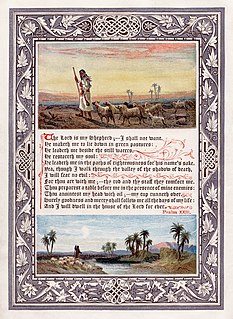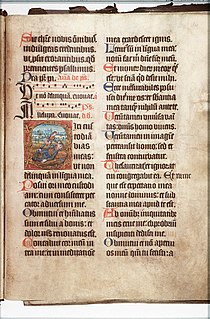
The Book of Psalms, commonly referred to simply as Psalms, the Psalter or "the Psalms", is the first book of the Ketuvim ("Writings"), the third section of the Tanakh, and a book of the Christian Old Testament. The title is derived from the Greek translation, ψαλμοί, psalmoi, meaning "instrumental music" and, by extension, "the words accompanying the music". The book is an anthology of individual psalms, with 150 in the Jewish and Western Christian tradition and more in the Eastern Christian churches. Many are linked to the name of David, but modern scholarship rejects his authorship.

Song of Ascents is a title given to fifteen of the Psalms, 120–134, each starting with the superscription Shir Hama'aloth, or, in the case of Psalm 121, Shir Lama'aloth. They are also variously called Gradual Psalms, Songs of Degrees, Songs of Steps, songs for going up to worship or Pilgrim Songs.

Psalm 119 is the 119th psalm of the Book of Psalms, beginning in English in the King James Version: "Blessed are the undefiled in the way, who walk in the law of the Lord". The Book of Psalms is in the third section of the Hebrew Bible, the Khetuvim, and a book of the Christian Old Testament. The psalm is referred to in Hebrew by its opening words, "Ashrei temimei derech". In the Greek Septuagint version of the Bible, and in its Latin translation Vulgate, this psalm is Psalm 118 in a slightly different numbering system. In Latin, it is known as "Beati inmaculati in via qui ambulant in lege Domini." The psalm is a hymn psalm.

Psalm 23 is the 23rd psalm of the Book of Psalms, beginning in English in the King James Version: "The Lord is my Shepherd". The Book of Psalms is the third section of the Hebrew Bible, and a book of the Christian Old Testament. In the Greek Septuagint version of the Bible, and in its Latin translation in the Vulgate, this psalm is Psalm 22 in a slightly different numbering system. In Latin, it is known by the incipit, "Dominus reget me".

Psalm 103 is the 103rd psalm of the Book of Psalms, beginning in English in the King James Version: "Bless the LORD, O my soul". The Book of Psalms is part of the third section of the Hebrew Bible, and a book of the Christian Old Testament. In the Greek Septuagint version of the bible, and in its Latin translation in the Vulgate, this psalm is Psalm 102 in a slightly different numbering system. In Latin, it is known as "Benedic anima mea Domino". The psalm is a hymn psalm.

Psalm 130 is the 130th psalm of the Book of Psalms, one of the Penitential psalms. The first verse is a call to God in deep sorrow, from "out of the depths" or "out of the deep", as it is translated in the King James Version of the Bible and the Coverdale translation respectively. It is one of 15 psalms that begin with the words "A song of ascents". The Book of Psalms is in Ketuvim, the third section of the Hebrew Bible, and is a book of the Christian Old Testament. In the Greek Septuagint version of the Bible, and in the Latin Vulgate, this psalm is Psalm 129 in a slightly different numbering system. In Latin, it is known as De profundis.

Johann Sebastian Bach composed the church cantata Ich hatte viel Bekümmernis, BWV 21 in Weimar, possibly in 1713, partly even earlier. He used it in 1714 and later for the third Sunday after Trinity of the liturgical year. The work marks a transition between motet style on biblical and hymn text to operatic recitatives and arias on contemporary poetry. Bach catalogued the work as e per ogni tempo, indicating that due to its general theme, the cantata is suited for any occasion.

Psalm 42 is the 42nd psalm of the Book of Psalms, often known in English by its incipit, As the hart panteth after the water brooks. The Book of Psalms is the third section of the Hebrew Bible, and a book of the Christian Old Testament. In the Hebrew Bible, Psalm 42 opens the second of the five books (divisions) of Psalms. In the Greek Septuagint version of the bible, and generally in its Latin translations, this psalm is Psalm 41 in a slightly different numbering system, although the Nova Vulgata translation follows the Hebrew numbering. The psalm is a hymn psalm. It is one of twelve psalms attributed to the sons of Korah.

Psalm 3 is the third Psalm of the Bible. It is a personal thanksgiving to God, who answered the prayer of an afflicted soul. Psalm 3 is attributed to David, in particular, when he fled from Absalom his son. David, deserted by his subjects, derided by Shimei, pursued for his crown and life by his ungracious son, turns to his God, makes his supplications, and confesses his faith. The story of Absalom is found in the 2 Samuel, Chapters 13–18.

Psalm 13 is the 13th psalm of the Book of Psalms, beginning in English in the King James Version: "How long, O Lord". The Book of Psalms is the third section of the Hebrew Bible, and a book of the Christian Old Testament. In the Greek Septuagint version of the bible, and in its Latin translation in the Vulgate, this psalm is Psalm 12 in a slightly different numbering system. In Latin, it is known as "Usquequo Domine".

Psalm 25 is the 25th psalm of the Book of Psalms, beginning in English in the King James Version: "Unto thee, O LORD, do I lift up my soul.". The Book of Psalms is the third section of the Hebrew Bible, and a book of the Christian Old Testament. In the Greek Septuagint version of the Bible, and in the Latin Vulgate, this psalm is Psalm 24 in a slightly different numbering system. In Latin, it is known as "Ad te Domine levavi animam meam". The psalm, attributed to David, has the form of an acrostic Hebrew poem.

Psalm 31 is the 31st psalm of the Book of Psalms, beginning in English in the King James Version: "In thee, O LORD, do I put my trust". The Book of Psalms is part of the third section of the Hebrew Bible, and a book of the Christian Old Testament. In the slightly different numbering system in the Greek Septuagint version of the Bible, and in its Latin translation, the Vulgate, this psalm is Psalm 30. In Latin, it is known as "In te Domine speravi". As indicated in the first verse in the Hebrew, it was composed by David.

Psalm 38 is the 38th psalm of the Book of Psalms and titled "A psalm of David to bring to remembrance". In the slightly different numbering system in the Greek Septuagint version of the Bible, and in the Latin Vulgate, this psalm is Psalm 37.

Psalm 39 is the 39th psalm of the Book of Psalms, beginning in English in the King James Version: "I said, I will take heed to my ways, that I sin not with my tongue". The Book of Psalms is part of the third section of the Hebrew Bible, and a book of the Christian Old Testament. In the slightly different numbering system in the Greek Septuagint version of the Bible, and in its Latin translation, the Vulgate, this psalm is Psalm 38. In Latin, it is known as "Dixi custodiam vias meas". It is a meditation on the fragility of man before God, ending in a prayer for a peaceful life.

Psalm 138 is the 138th psalm of the Book of Psalms, beginning in English in the King James Version: "I will praise thee with my whole heart". The Book of Psalms is found in the third section of the Hebrew Bible, and a book of the Christian Old Testament. In the Greek Septuagint version of the bible, and in its Latin translation in the Vulgate, this psalm is Psalm 137 in a slightly different numbering system. In Latin, it is known as "Confitebor tibi Domine in toto corde meo". The psalm is a hymn psalm.

Psalm 131 is the 131st psalm of the Book of Psalms, beginning in English in the King James Version: "Lord, my heart is not haughty". The Book of Psalms is the third section of the Hebrew Bible, and a book of the Christian Old Testament. In the Greek Septuagint version of the bible, and in its Latin translation in the Vulgate, this psalm is Psalm 130 in a slightly different numbering system. In Latin, it is known as "Domine non est exaltatum cor meum". The psalm is one of the fifteen Songs of Ascents, and one of three psalms consisting of only three verses. It is attributed to David and is classified among the psalms of confidence.

Psalm 124 is the 124th psalm of the Book of Psalms, beginning in English in the King James Version: "If it had not been the LORD who was on our side, now may Israel say". The Book of Psalms is the third section of the Hebrew Bible, and a book of the Christian Old Testament. In the Greek Septuagint and the Latin Vulgate, this psalm is known as Psalm 123 in a slightly different numbering system. In Latin, it is known by as, "Nisi quia Dominus". It is one of fifteen psalms that begin with the words "A song of ascents".

Psalm 121 is the 121st psalm of the Book of Psalms, beginning in English in the King James Version: "I will lift up mine eyes unto the hills, from whence cometh my help." In the Greek Septuagint version of the bible, and in the Latin Vulgate, this psalm is Psalm 120 in a slightly different numbering system. In Latin, it is known as "Levavi oculos meos in montes". It is one of 15 psalms categorized as Song of Ascents, although unlike the others, it begins, Shir LaMa'alot.
Psalm 71 is the 71st psalm of the Book of Psalms, beginning in English in the King James Version: "In thee, O LORD, do I put my trust: let me never be put to confusion". In the Greek Septuagint version of the Bible, and in the Latin Vulgate, this psalm is Psalm 70 in a slightly different numbering system. In Latin, it is known as "In te Domine speravi".

Psalm 84 is the 84th psalm of the Book of Psalms, beginning in English in the King James Version: "How amiable are thy tabernacles, O Lord of hosts!". The Book of Psalms forms part of the Ketuvim section of the Hebrew Bible and part of the Christian Old Testament. In the slightly different numbering system of the Greek Septuagint version of the bible, and in its Latin translations, the Vulgate, this psalm is Psalm 83. In Latin, it is known as "Quam dilecta tabernacula tua Domine virtutum". The psalm is a hymn psalm, more specifically a pilgrimage psalm, attributed to the sons of Korah.



















